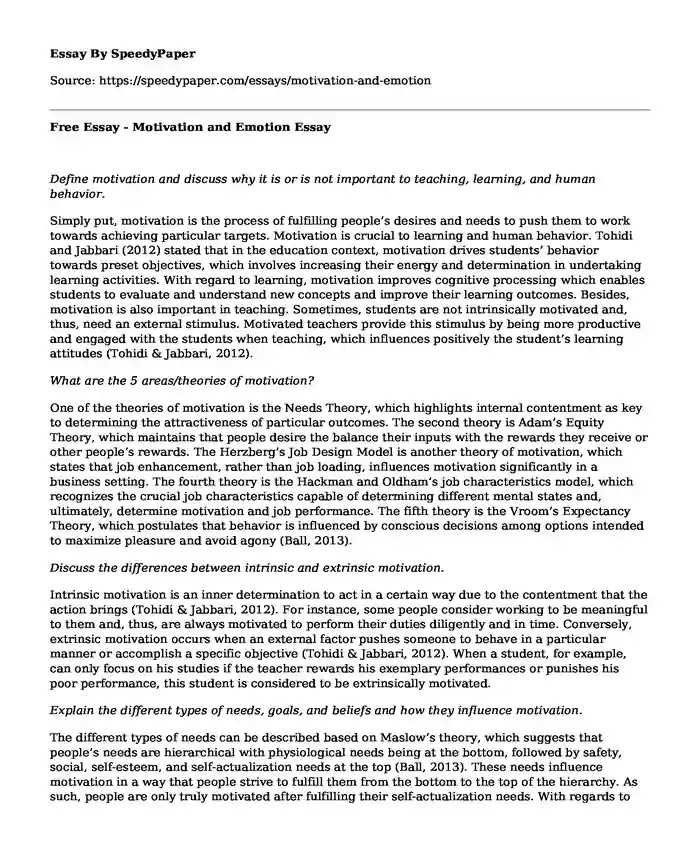
| Type of paper: | Essay |
| Categories: | Motivation Human behavior Emotional intelligence |
| Pages: | 3 |
| Wordcount: | 742 words |
Define motivation and discuss why it is or is not important to teaching, learning, and human behavior.
Simply put, motivation is the process of fulfilling people’s desires and needs to push them to work towards achieving particular targets. Motivation is crucial to learning and human behavior. Tohidi and Jabbari (2012) stated that in the education context, motivation drives students’ behavior towards preset objectives, which involves increasing their energy and determination in undertaking learning activities. With regard to learning, motivation improves cognitive processing which enables students to evaluate and understand new concepts and improve their learning outcomes. Besides, motivation is also important in teaching. Sometimes, students are not intrinsically motivated and, thus, need an external stimulus. Motivated teachers provide this stimulus by being more productive and engaged with the students when teaching, which influences positively the student’s learning attitudes (Tohidi & Jabbari, 2012).
What are the 5 areas/theories of motivation?
One of the theories of motivation is the Needs Theory, which highlights internal contentment as key to determining the attractiveness of particular outcomes. The second theory is Adam’s Equity Theory, which maintains that people desire the balance their inputs with the rewards they receive or other people’s rewards. The Herzberg’s Job Design Model is another theory of motivation, which states that job enhancement, rather than job loading, influences motivation significantly in a business setting. The fourth theory is the Hackman and Oldham’s job characteristics model, which recognizes the crucial job characteristics capable of determining different mental states and, ultimately, determine motivation and job performance. The fifth theory is the Vroom’s Expectancy Theory, which postulates that behavior is influenced by conscious decisions among options intended to maximize pleasure and avoid agony (Ball, 2013).
Discuss the differences between intrinsic and extrinsic motivation.
Intrinsic motivation is an inner determination to act in a certain way due to the contentment that the action brings (Tohidi & Jabbari, 2012). For instance, some people consider working to be meaningful to them and, thus, are always motivated to perform their duties diligently and in time. Conversely, extrinsic motivation occurs when an external factor pushes someone to behave in a particular manner or accomplish a specific objective (Tohidi & Jabbari, 2012). When a student, for example, can only focus on his studies if the teacher rewards his exemplary performances or punishes his poor performance, this student is considered to be extrinsically motivated.
Explain the different types of needs, goals, and beliefs and how they influence motivation.
The different types of needs can be described based on Maslow’s theory, which suggests that people’s needs are hierarchical with physiological needs being at the bottom, followed by safety, social, self-esteem, and self-actualization needs at the top (Ball, 2013). These needs influence motivation in a way that people strive to fulfill them from the bottom to the top of the hierarchy. As such, people are only truly motivated after fulfilling their self-actualization needs. With regards to goals, they can be either time-based such as short-term and long-term goals or context-based such as financial and career goals (Scott, 2020). Goals influence motivation since by setting goals, people commit and focus their energy on achieving them. Goal-setting is determined significantly by people’s beliefs, which include self-efficacy and self-sabotaging beliefs. For instance, self-efficacy beliefs make people perceive their strengths in undertaking certain tasks and, thus, set goals that guide them in accomplishing the tasks and are motivated to achieve them.
Define self-worth and self-efficacy and their importance in motivation.
Eccles and Wigfield (2002) defined self-efficacy as a person’s confidence in his ability to coordinate and perform specific activities. Self-efficacy is crucial to motivation since it makes people believe that they have control over outcomes. As such, people will be motivated to use their capabilities to undertake specific tasks and even choose more challenging ones. Conversely, self-worth is the sense of building and retaining a positive self-image (Eccles & Wigfield, 2002). The importance of self-worth to motivation is that for people to maintain this positive image, they push themselves to work to achieve a particular objective, failure to which their self-worth will be damaged.
References
Ball, B. (2013). A summary of motivation theories by Benjamin Ball. Theory of Motivation, 2(1), 26. https://www.yourcoach.be/blog/wp-content/uploads/2012/03/A-summary-of-motivation-theories1.pdf
Eccles, J. S., & Wigfield, A. (2002). Motivational beliefs, values, and goals. Annual review of psychology, 53(1), 109-132. https://www.annualreviews.org/doi/pdf/10.1146/annurev.psych.53.100901.135153
Scott, S. (2020). 7 Types of Goals: The Ultimate Guide to Goal Categories. Develop Good Habits. https://www.developgoodhabits.com/types-of-goals/
Tohidi, H., & Jabbari, M. M. (2012). The effects of motivation in education. Procedia-Social and Behavioral Sciences, 31, 820-824. https://core.ac.uk/download/pdf/82127958.pdf
Cite this page
Free Essay - Motivation and Emotion. (2023, Aug 10). Retrieved from https://speedypaper.net/essays/motivation-and-emotion
Request Removal
If you are the original author of this essay and no longer wish to have it published on the SpeedyPaper website, please click below to request its removal:
- Reasons Why People Lie - Essay Sample
- Essay Example on Street Gangs Recruitment and How It Mirrors Terrorist Recruitment
- Free Essay with Research Overview on Sexual Harassment in Public Spaces
- Essay Sample on Group Dynamics and Intergroup Conflict
- Free Essay - Motivation and Emotion
- Essay Sample on Applied Research Methods in Psychology
- Free Essay. Illegal Hiring Analysis
Popular categories




